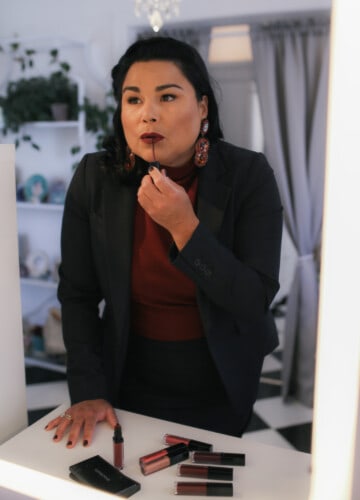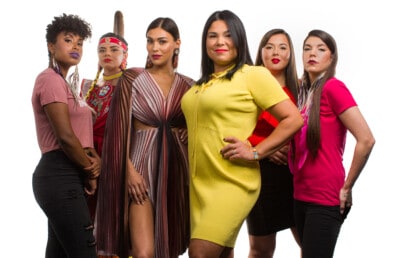Jenn Harper first learned about residential schools in 2015, when the Truth and Reconciliation reports were released.
Harper, then newly sober, was floored. “It was the biggest eye-opening experience of my life,” she says. “I literally had no idea about residential school. None whatsoever. That’s what moved me to go, holy crap. If I don’t know, and I look in the mirror every day and see an Indigenous woman, how is any other person supposed to know this? And have deeper empathy and understanding of the historical pain and trauma?”
While her own mother is white, Harper had never really gotten to know her paternal grandmother, who herself was a survivor of the residential school system. “I don’t think, as humans, we really understand how important it is to know who you are and where you come from; and how that plays a big role in where you’re going,” she says. The aftereffects of the residential school system continue to reverberate throughout many Indigenous communities; with high youth suicide rates, addiction and displacement. Harper wanted to create something that gave hope; something that could let every young Indigenous person “know their enormous value,” she says.

With $500 and a prayer to the Creator, she started Cheekbone Beauty; an Indigenous-owned, cruelty-free, high-quality cosmetics company with a mission: to make a difference in the lives of Indigenous youth through donations addressing the educational funding gap; and to create a space in the beauty industry where Indigenous youth felt represented and seen. Since then, the company has grown from a basement side hustle to a full-time operation, complete with an appearance on Dragons’ Den.
Less than a decade ago, Jenn Harper wouldn’t have imagined a life this full. She was in a dark place; starting the day with a shot of vodka, in and out of rehab. “I don’t think people knew how bad it really was, I think only your family gets to see that horrible side of alcoholism. It was awful.”
Harper remembers as a ten-year-old, when she and a friend stole a beer to share. “I was a very shy kid and we got giddy. I was funny, I remember her laughing her head off… and the memory of me thinking ‘oh my god I love the way this makes me feel’ still sits with me to this day,” she recalls. “Creating that happiness, then having a traumatic childhood on top of it… I created a neural pathway that continued from when I was 10 to when I was 38.”
She spiraled out until 2014, when her husband said he would leave and take the kids if she didn’t get sober. “I had no options left,” she says. It was then she began her journey toward recovery.
“[In therapy] I’ve learned that you cannot love anyone more than you love yourself,” she says. “So when you’re an addict, you’re not loving yourself; the way you’re treating your body, you’re masking all of these horrible, painful things. It wasn’t until I got well that I was fully able to show my children how much I love them. As a recovered person, I live in a constant state of guilt, but I fight that with the realization that I can’t go back in the past and change it; I can only make their futures better.”
Harper is actually grateful for what she went through, because “without that pain and trauma, I wouldn’t be who I am today. And without giving [alcohol] up, I wouldn’t be able to build what we’re building. It’s interesting how I think about entrepreneurship and alcoholism… For me, overcoming alcoholism was literally like overcoming a mountain that I never even thought would be possible to overcome. Overcoming something like alcoholism gives me the courage to keep going with building this brand, because I realize what’s possible.”
Her background in catering and restaurant management taught her that “customer experience is number one,” she says. “When you gain this loyal audience and treat people well, they will keep coming back.” The second half of her career was spent in sales and marketing in the food industry. “I learned that everything is pretty much manufactured in the same facilities, just branded differently–the beauty industry turns out to be exactly the same.”

Since her Dragons’ Den appearance, sales have been steady; and Harper is savvy about using social media to promote the brand. After these inaugural successes, Harper is moving to develop more sustainable, socially-conscious products using directly sourced raw ingredients. “Now we’re in the phase that we’ve created this brand, how can we be completely different from what’s happening in the beauty space in terms of products and formulations? I’m on this mission, and I feel so compelled. I don’t know if this is like my Indigenous blood, but we need to make products that are not robbing the land, and are not going to affect our ecosystems when they go into the land.”
Heading into 2020, Harper is looking to open a manufacturing space in the Niagara region that “will be like fishbowl behind glass,” she says. “So our customers or community can come to us and see exactly what we’re doing, what we’re making.”

While a portion of proceeds from Cheekbone Beauty sales are donated to Shannen’s Dream and the Caring Society, the other major benefit comes with helping Indigenous youth feel seen.
“A woman (who was the adoptive mother of a 10-year old Indigenous girl) ordered one of our products,” says Harper. “Our postcards have images of our models who are Indigenous, and this little girl said to her mom: “Oh my goodness, they look like me!” The whole day, her mother witnessed this transformation in this little girl’s character. Representation is just so important.”
I ask Harper what she feels most proud of. “I don’t feel proud,” she explains. “I feel grateful. Lots of people start businesses, and the chances of a business being successful is really low. There’s still so much work to do, but I’m proud to show people that you can recover from mistakes. People don’t get well because they believe that the thing that happened to them, or the thing that they did, or whatever they struggle with–we get stuck in those phases where you think you can’t move on from that. I’m proud of the fact that I can show Indigenous youth that you can turn it all around–any day, any minute, any second. You have the power to decide to do that. And no one ever does anything on their own, you need to ask for help when you’re struggling. I want Indigenous youth around the world to see our brand and say, ‘our people did that. And if one of our people can do that, then I can do that.”



 Follow Us On Instagram
Follow Us On Instagram
